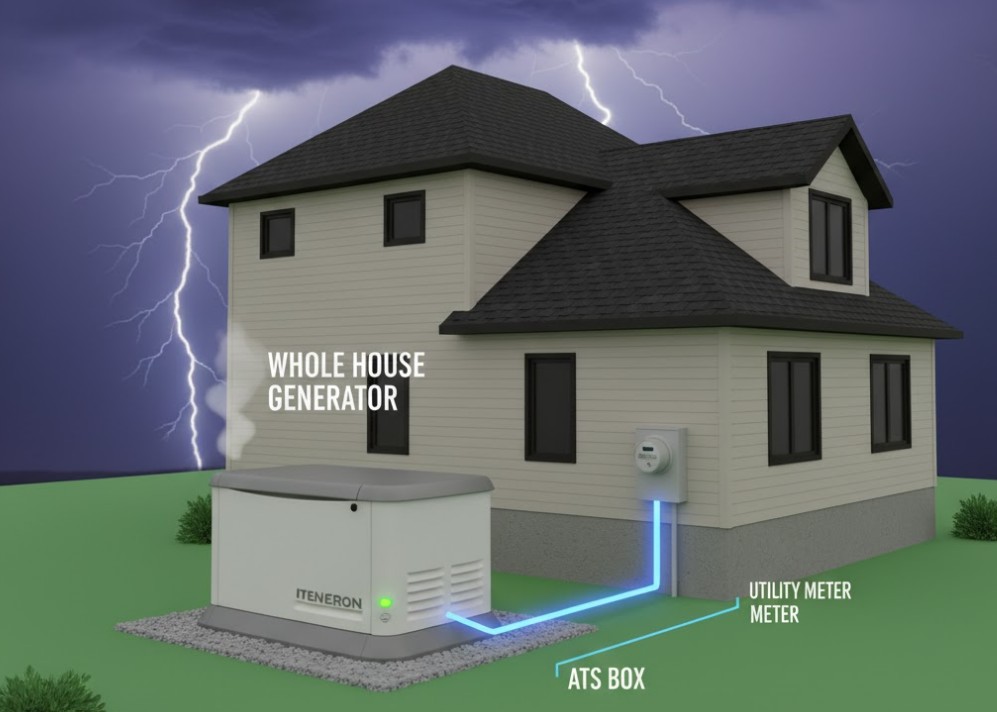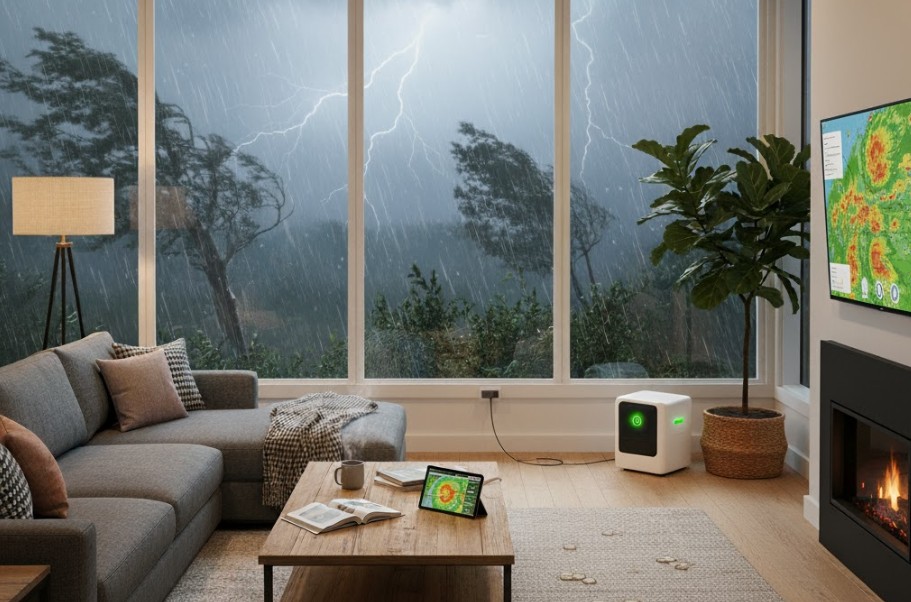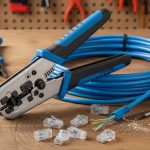The answer, like most things in real estate, is nuanced. While a generator is not always a dollar-for-dollar investment return, its impact on a home’s marketability, perceived value, and the preservation of the property during an outage is significant. The journey to understanding its true value requires looking beyond the initial installation cost and examining its role in today’s changing environment. We will delve into the hard numbers—the potential return on investment (ROI)—as well as the intangible benefits that modern buyers are increasingly willing to pay a premium for.
The Shifting Landscape of Power Reliability
Why are homeowners increasingly considering the heavy investment in a whole house generator? The reasons are systemic and growing:
- Aging Infrastructure: Much of the electrical grid across the nation is decades old and struggling to keep pace with modern demand and climate challenges.
- Climate Extremes: Severe weather events—including intensified hurricanes, prolonged snowstorms, and widespread wildfires—are becoming more frequent and severe, leading to longer and more unpredictable power interruptions.
- Increased Home Dependency: Homes are smarter than ever, relying on electricity for everything from security systems and smart thermostats to sophisticated refrigeration and heating systems.
- The Work-From-Home Economy: For millions of people, a power outage means a complete loss of income and productivity, making uninterrupted power a career necessity, not just a convenience.
This reality has transformed the whole house generator from a specialized item for homes in remote areas to a highly desirable, and sometimes expected, feature in mainstream real estate markets.
Understanding the Whole House Generator System
Before assessing its value, it is crucial to understand what a whole house generator is and how it differs from a typical portable unit. A whole house generator, often referred to as a standby generator, is a permanent fixture designed to automatically provide power to your entire home or selected critical circuits the moment a power outage occurs.
How Standby Generators Operate
The defining feature of a standby unit is the Automatic Transfer Switch (ATS). When the utility power drops, the ATS senses the loss, signals the generator to start, and safely transfers the home’s electrical load to the generator. When utility power returns, the ATS reverses the process. This seamless, hands-off operation is what elevates its value proposition above portable alternatives.
Fuel Sources and Installation
Standby generators typically run on:
- Natural Gas: The most common choice, as it connects directly to the home’s existing gas line, offering an unlimited run time (barring a disruption to the gas network).
- Liquid Propane (LP): An excellent option where natural gas lines are unavailable. It is stored in a large tank on the property, but run time is limited by the tank’s size.
Due to the complexity and safety requirements, installation involves connecting to the home’s main electrical panel and the fuel source, necessitating a licensed electrician and a plumber/gas fitter. This professional installation contributes significantly to the upfront cost, but also ensures the system operates safely and legally, which is key to its market value.

The Core Question: Does a Whole House Generator Add Value to Your Home?
Let’s tackle the question directly, separating the appraised value from the marketability premium.
The Appraised Value and Return on Investment (ROI)
From a strict appraisal standpoint, permanent installations like a whole house generator are considered a home improvement, much like a new furnace or central air conditioning. Appraisers will generally assign a tangible value to the system. However, the return is rarely 100%.
According to various industry reports and real estate studies, the typical ROI on a whole house generator ranges between 50% and 75% of the total installation cost. This means if you spend $15,000 on purchase and installation, you might expect the appraised value of your home to increase by $7,500 to $11,250.
However, this number can be significantly higher in certain scenarios:
- High-Risk Zones: In areas prone to hurricanes (coastal regions), severe ice storms (Northern states), or major seismic events where long-term power loss is common, the generator is a critical piece of infrastructure, pushing the ROI toward the higher end or even above 100% in a seller’s market.
- Luxury Markets: In high-end homes where maintaining comfort and protecting expensive electronics/finishes is paramount, buyers expect redundancy, and the generator is a necessary component to achieving the asking price.
In contrast, in areas with extremely reliable power and low-risk weather, the generator might be seen more as a niche luxury, resulting in an ROI closer to the 50% mark.
Furthermore, while standby generators are a powerful solution, some homeowners also consider other self-sufficiency options, such as solar power systems which offer different ROI and environmental benefits. If you are weighing power options, you might be interested in learning about the differences between different types of solar setups: Grid-Tied Solar vs. Off-Grid Solar Systems.
The Marketability Premium: The Buyer’s Perspective
Where the generator truly shines is in its marketability premium. In a competitive housing market, this feature acts as a powerful differentiator. When two identical homes are listed, the one with the professionally installed, fully maintained whole house generator often sells:
- Faster: Buyers appreciate the move-in-ready nature of the protection.
- Closer to or Above Asking Price: The peace of mind translates directly into a willingness to pay more, especially if the home is being viewed after a well-publicized regional power outage.
In the mind of a potential buyer, the generator is a pre-paid insurance policy against future disaster. It removes a major point of friction—the thought of having to research, purchase, permit, and install a system themselves, which can be a complex and time-consuming process post-purchase.
Factors That Solidify the Generator’s Value
The perceived and actual value a generator adds is not solely dependent on its presence, but on several key factors:
Location and Regional Power History
A generator’s value is deeply tied to geography. A home in a coastal area of Florida, frequently impacted by hurricanes, gains a disproportionately higher value from a standby generator than a home in, say, San Diego, where utility power is generally robust. Real estate agents in high-risk zones consistently report that homes with generators are frequently tagged as “must-see” listings and are a non-negotiable feature for many buyers.
The Generator’s Quality, Size, and Fuel Source
A generator that is undersized or uses an inconvenient fuel source (like gasoline that must be manually refilled every few hours) will not command the same value as a properly sized, permanent unit. Buyers look for reliability and longevity. A system from a reputable brand that is correctly sized to handle the home’s essential loads (or the whole house) and uses a steady fuel source like natural gas or a large propane tank is the ideal scenario for maximizing resale value.
If you’re exploring which models offer the best performance, reliability, and thus the best value, doing your homework on the equipment is essential. Understanding the market for the best systems can help you choose an investment that pays off at resale. You can research which models are highly rated and most reliable here: Best Whole House Generators.
The Proof of Maintenance
For a potential buyer, an old, rusty, unmaintained generator is a liability, not an asset. A generator that has been regularly serviced by a certified technician, with a clear history of maintenance records (often called a ‘service passport’), is critical. When it comes time to sell, presenting these records validates the system’s reliability and transfers the peace of mind to the new owner, justifying a higher price point.
Installation Quality and Compliance
A poorly installed generator that doesn’t meet local codes is a huge detriment to value. The value is added when the system is installed professionally, permitted by the local jurisdiction, and connected via a proper, modern ATS. This ensures safety and legality, factors that eliminate risk for the buyer.
Beyond Monetary Value: The Intangible Benefits
The true worth of a whole house generator often lies in its intangible benefits—the value it adds to the homeowner’s life and the protection it provides to their assets. These are the benefits that indirectly support a higher asking price.
Protection of Property and Investment
During a winter storm, a sustained power outage can lead to frozen and burst pipes, resulting in tens of thousands of dollars in water damage. In a damp climate, an outage can mean the failure of a sump pump, leading to a flooded basement. The generator acts as an insurance policy that preserves the structural integrity and high-value components of the home, protecting the owner’s largest asset. This includes:
- Sump Pumps: Essential in flood-prone basements.
- HVAC Systems: Preventing freezing in the winter and mold/humidity issues in the summer.
- Refrigeration: Preventing the spoilage of hundreds of dollars in food and, more critically, preserving essential medications.
Safety, Security, and Peace of Mind
The ability to keep lights on, security systems armed, and garage doors operational provides a critical level of safety. For families with young children, elderly members, or those relying on medical equipment, an uninterrupted power source is non-negotiable. This is the “peace of mind premium” that buyers are willing to pay for—the assurance that their family and home will remain safe and functional regardless of the conditions outside.
Maintaining Comfort and Modern Convenience
In a fully powered home, modern living can continue unabated. You can still use the oven, wash clothes, and heat or cool your home. In a world accustomed to instant functionality, the ability to operate standard home appliances is highly valued. For example, while the decision to purchase a generator is large, it’s often intertwined with the functionality of every other appliance in the home. Just as people weigh the differences in choosing specific cooking appliances, homeowners now weigh the differences in powering all their modern conveniences, big or small: Microwave Oven vs. Convection Oven.

Whole House vs. Portable: The Value Comparison
A critical part of the value proposition is the superiority of the whole house unit compared to its smaller, portable counterpart. While portable generators are cheaper, they offer significantly less value upon resale for several reasons:
- Manual Operation: Portable units require the owner to be home, drag the unit outside, manually connect cords, and refuel frequently—a process that is inconvenient and potentially dangerous in adverse weather.
- Limited Power: They typically power only a handful of essential items via extension cords, forcing the homeowner to live a scaled-back life during an outage.
- Safety Hazards: Portable generators carry a greater risk of carbon monoxide poisoning if operated incorrectly and pose a fire hazard if not handled carefully.
In contrast, the automatic, higher-capacity, and permanently installed whole house unit addresses all these issues, thereby commanding a much higher value in the eyes of a serious buyer. For those looking for smaller, flexible backup options, there are great alternatives, but they do not compete with the standby unit in terms of resale value for the whole home. If you are comparing smaller, highly efficient units, it’s worth looking at the differences in portable technology: Best Inverter Generator for Home Backup.
Maximizing the ROI: Strategic Considerations for Installation
To ensure your investment yields the highest possible return, strategic planning is essential. A generator is not just a purchase; it’s a project.
Sizing the System Correctly
An oversized generator adds unnecessary cost without adding equivalent resale value. Conversely, an undersized unit is a major turn-off for buyers. A professional electrician should conduct a thorough energy audit to determine the home’s critical load requirements. The ideal scenario for resale value is a system that can comfortably run the essentials (furnace, AC, refrigerator, well pump, key outlets, and lights) plus one or two key comfort items (e.g., a dishwasher or electric range), avoiding unnecessary and costly power capacity.
Permitting and Professional Installation
Do not attempt a DIY installation. A professionally installed system with all necessary local permits is non-negotiable for maximizing resale value. Appraisers and buyers’ inspectors will verify compliance with building codes. An unpermitted installation is a liability that can cost more to remedy than the initial savings.
Landscaping and Placement
While often overlooked, the aesthetic placement of the generator matters. A unit placed out of sight, yet still accessible for maintenance, is ideal. It should meet all setback requirements and noise ordinances. Integrating the unit seamlessly into the exterior of the home, perhaps behind a decorative, approved enclosure, contributes positively to the home’s curb appeal and overall perceived value.
The Maintenance Factor and Long-Term Value
Like a car, a generator requires routine maintenance to maintain its reliability, which is its core value proposition. Scheduled oil changes, filter replacements, and system checks ensure the unit starts instantly when needed. A buyer purchasing a home with a well-maintained, five-year-old generator will often value it more than a house with a brand-new but neglected unit.
This commitment to maintenance shows the buyer that the previous homeowner cared about the integrity of the system, which can positively influence their perception of the home’s overall condition and justify a higher price.
The Annual Service Contract
The best way to document maintenance is through an annual service contract with a certified dealer. Providing a potential buyer with a printout of the past five years of service records is a powerful sales tool that validates the investment.
Final Thoughts
So, does a whole house generator add value to your home? Unequivocally, yes. While the hard dollar ROI may settle in the 50-75% range for a direct appraisal, its true value is realized in the soft benefits and the marketability premium it commands.
In a modern era defined by digital connectivity and climate instability, a whole house generator is transitioning from an optional amenity to an expected piece of critical home infrastructure, particularly in high-risk geographic regions. It is an investment that preserves your assets, guarantees the continuity of modern life, and offers unparalleled peace of mind.
For the seller, it shortens the time on the market and provides a powerful negotiating point. For the buyer, it is an upfront solution to an increasingly common problem. By ensuring professional installation, proper sizing, and diligent maintenance, homeowners can ensure their whole house generator investment not only provides security but also maximizes their financial return when the time comes to sell.
Amranul is a highly experienced product review writer with a passion for helping readers make smart, informed purchasing decisions. Since 2018, he has specialized in thoroughly researching and analyzing a wide range of products to deliver honest, in-depth reviews. Amranul combines technical accuracy with clear, engaging writing to break down complex product features and highlight true user value. Look for his reviews to find reliable information and expert insights you can trust before you buy!





